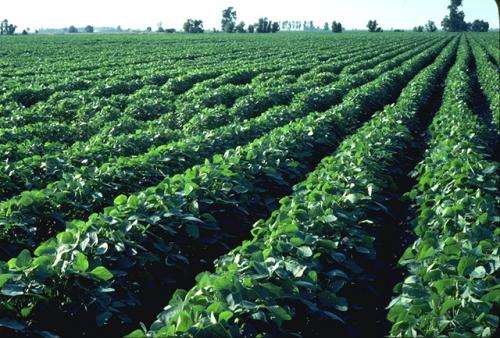We can feed the world if we change our ways

Current crop yields could provide nutritious food for the projected 2050 global population, but only if we make radical changes to our dietary choices, a new study shows.
Researchers from Lancaster University have analysed global and regional food supplies to reveal the flows of calories, protein and vital micro-nutrients from production through to human consumption, in a study published in Elementa, Science of the Anthropocene.
Combining data from the UN Food and Agriculture Organisation (FAO) with food nutrient data, and information on animal grazing and on human nutritional need, they explore whether we could feed a growing population with the food we already produce.
They conclude that, even without improvements in crop yield, current crop production is sufficient to provide enough healthy food for the predicted 9.7 billion world population in 2050, although this will require radical shifts in behaviour.
Most importantly they say there need to be fundamental changes to human diets, replacing most meat and dairy with plant-based alternatives, and a greater willingness to eat crops such as maize which are currently fed to animals.
"Our analysis finds no nutritional case for feeding human-edible crops to animals, which reduces calorie and protein supplies. If society continues on a 'business-as-usual' dietary trajectory, a 119% increase in edible crops grown will be required by 2050", said Professor Nick Hewitt, of the Lancaster Environment Centre.
The researchers acknowledge that meat and dairy, particularly that are produced from grass, pasture and cereal crop residues, may be important to people who do not have access to diverse food types and who cannot access dietary supplements.
"However", they conclude, "Overall, industrialised meat and dairy production, which currently relies on feeding 34% of human-edible crop calories to animals globally, is highly inefficient in terms of the provision of human nutrition."
Reducing waste and excess consumption is also important, but quantitively less significant, the study shows. There is also a need for very significant changes to the socio-economic conditions of many people, to ensure that everyone gets access to a healthy, balanced diet.
"As well as following the flow of all human-edible and non-human-edible food calories, we track protein, vitamin A, iron and zinc, because shortages of these have been identified as the major causes of 'hidden hunger'," Professor Hewitt explained.
The analysis shows little scope for biofuel production, according to Professor Mike Berners-Lee, of the University's Institute for Social Futures, and director of Small World Consulting, which is based within the Lancaster Environment Centre.
He said: "Currently, 16% of crops available for eating are diverted to non-food uses, mainly biofuel. Increasing market pressures for biofuels could further stress the global food system."
The research does not take account of crop yield changes such as those that may result from new technologies, land use or demographic changes, farming practices or climate change, but simply keeps crop yields at 2013 levels.
Professor Berners-Lee added: "There is currently widespread emphasis on increasing crop yields and reducing waste as the main mechanisms for ensuring global food security. But the potential nutritional benefits of increased crop yields would be entirely lost if the additional crop production was diverted to biofuels and largely lost if diverted to animals.
"Achieving global food security while reducing negative environmental impacts is one of the greatest challenges facing humanity."
More information: M. Berners-Lee et al, Current global food production is sufficient to meet human nutritional needs in 2050 provided there is radical societal adaptation, Elem Sci Anth (2018). DOI: 10.1525/elementa.310
Provided by Lancaster University


















